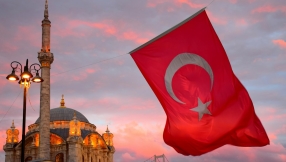A former foreign office minister and a senior Catholic have urged Boris Johnson to heed the advice of Tom Tugendhat MP and approach Pope Francis and the Archbishop of Canterbury to help negotiate the release of the British mother Nazanin Zaghari-Ratcliffe who is imprisoned in Iran.
The support for Tugendhat's suggestion comes as Christian Today has learned that neither Lambeth Palace nor Pope Francis has, at the time of writing, received any approach from the Foreign Office. Christian Today has approached the Foreign Office for comment.
Tugendhat, the chair of the foreign affairs committee of MPs and Conservative MP for Tonbridge and Malling, put it to the Foreign Secretary that religious leaders be used to negotiate Zaghari-Ratcliffe's release with the Islamic clerics who run Iran's judicial system.
'This poor woman is being used as a political football not only sadly here but in Iran,' Tugendhat, who is a Catholic, told MPs in the House of Commons yesterday.
'Would he [Johnson] consider calling on people in our own system who could talk to the Mullahs, perhaps the Archbishop of Canterbury or indeed the Holy Father, to speak on behalf of this woman and seek to broker her release?'
Responding, Johnson again apologised for troublesome remarks he made about the case earlier this month before Tugendhat's committee but simply said 'no stone will be left unturned' in efforts to secure her release.
The former Labour foreign office minister Denis MacShane and the Vatican author and former editor of the respected journal The Tablet, Catherine Pepinster, both pointed to the precedent for successful Vatican involvement in another case when, in March 2007, the Iranians detained four Royal Navy sailors who crossed into Iranian waters in a small boat.
MacShane told Christian Today: 'It is the religious leaders of Iran, rather than the state authorities that decide how people who are arrested are treated, and it would be a useful idea to ask religious leaders like the Pope and the Archbishop to address messages through their own private channels to the religious authorities in Iran, particularly as Christmas approaches and that is a time when families should be brought back together.'
Attacking Johnson's 'clumsy' approach on the issue so far, he added: 'Certainly I think that the Holy Father's appeal in 2007 when the four Royal Navy personnel were detained after they entered Iranian territorial waters helped in securing their early and relatively easy release. Unfortunately British politicians from Boris Johnson downwards, or upwards, have made things far worse by their clumsy, inaccurate and insulting language. The key priority when a British national is arrested or detained in an authoritarian country is to scale down the rhetoric and denunciations and ratchet up the unofficial contacts and the Vatican in particular has got the world's finest diplomatic and intelligence network that has been around far longer than the Foreign Office has and in my experience as a foreign office minister, the Vatican and its nuncios or ambassadors in different countries were a superb source of information and often had much better contacts than the official diplomats in other countries.'
Pepinster, the author of The Keys and the Kingdom: The British and the Papacy from John Paul II to Francis told Christian Today: 'I support Tom Tugendhat's proposal. I would urge the Foreign Secretary to seek the help of Pope Francis and Archbishop Justin Welby in seeking a compassionate response from the Iranians to the plight of Mrs Zaghari-Ratcliffe.
'This kind of intervention by religious leaders has an impact in a country like Iran. When Royal Navy personnel were detained by Tehran in 2007 when they mistakenly strayed into Iranian waters, the intervention of Pope Benedict XVI led to their release. The right words from a religious leader who is seen as a man of peace can prove a turning point.'
Francis Campbell, the former UK ambassador to the Holy See, said he could not comment at this time and referred the issue back to the Foreign Office, who have yet to comment on the question of approaching Pope Francis or Archbishop Welby, who has considerable negotiating experience around the world.













